McDonald's International Business Strategy: A Cultural Perspective
VerifiedAdded on 2023/06/10
|5
|919
|289
Essay
AI Summary
This essay examines McDonald's global business strategy, with a particular focus on its cultural adaptation techniques in international markets. The analysis highlights McDonald's strategic use of franchising and menu customization to cater to local preferences in countries such as China, India, and Saudi Arabia. The study showcases how McDonald's successfully navigated cultural differences by offering region-specific products and respecting local customs, such as prayer times and dietary restrictions. By understanding and adapting to local cultural nuances, McDonald's has achieved significant success in diverse global markets. Desklib offers more solved assignments and resources for students.
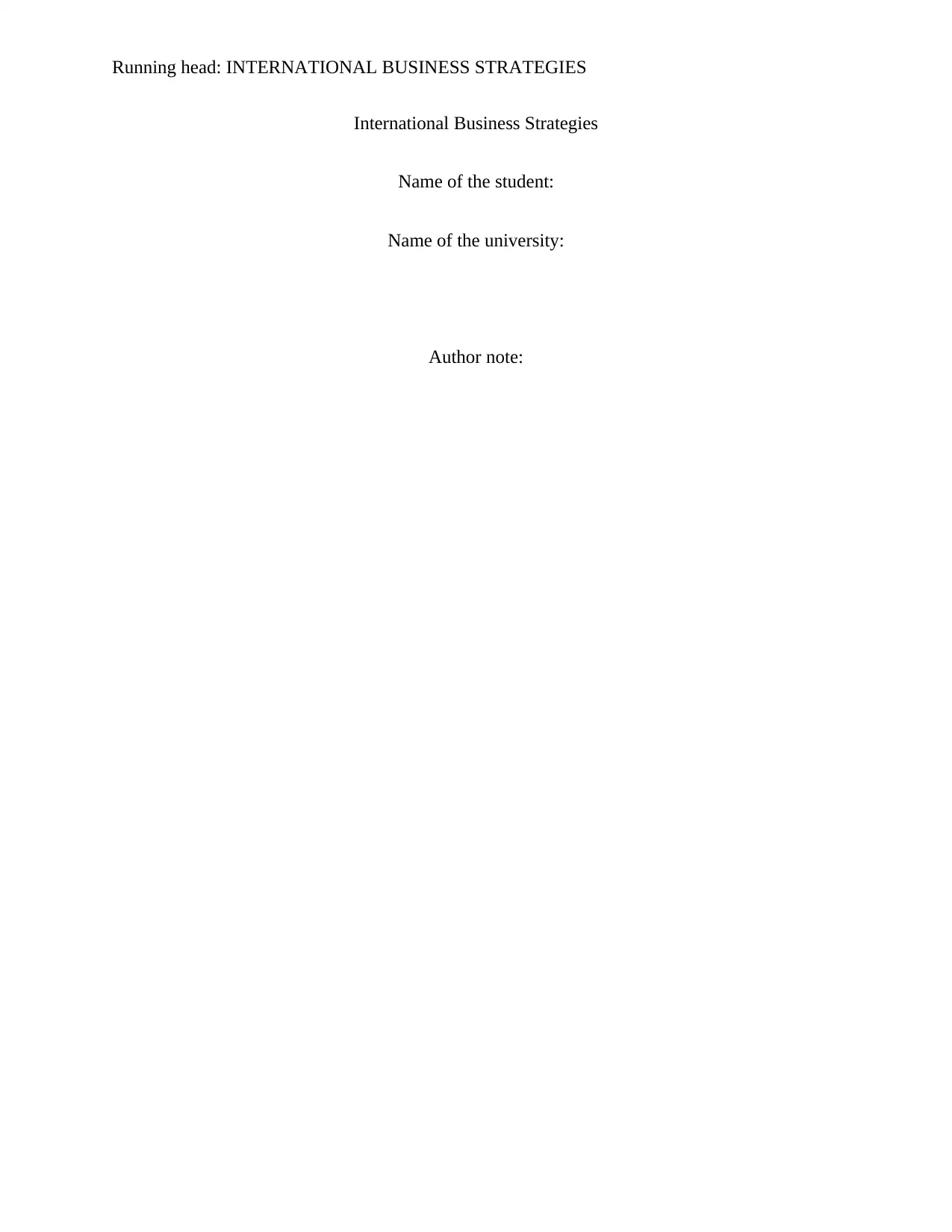
Running head: INTERNATIONAL BUSINESS STRATEGIES
International Business Strategies
Name of the student:
Name of the university:
Author note:
International Business Strategies
Name of the student:
Name of the university:
Author note:
Paraphrase This Document
Need a fresh take? Get an instant paraphrase of this document with our AI Paraphraser
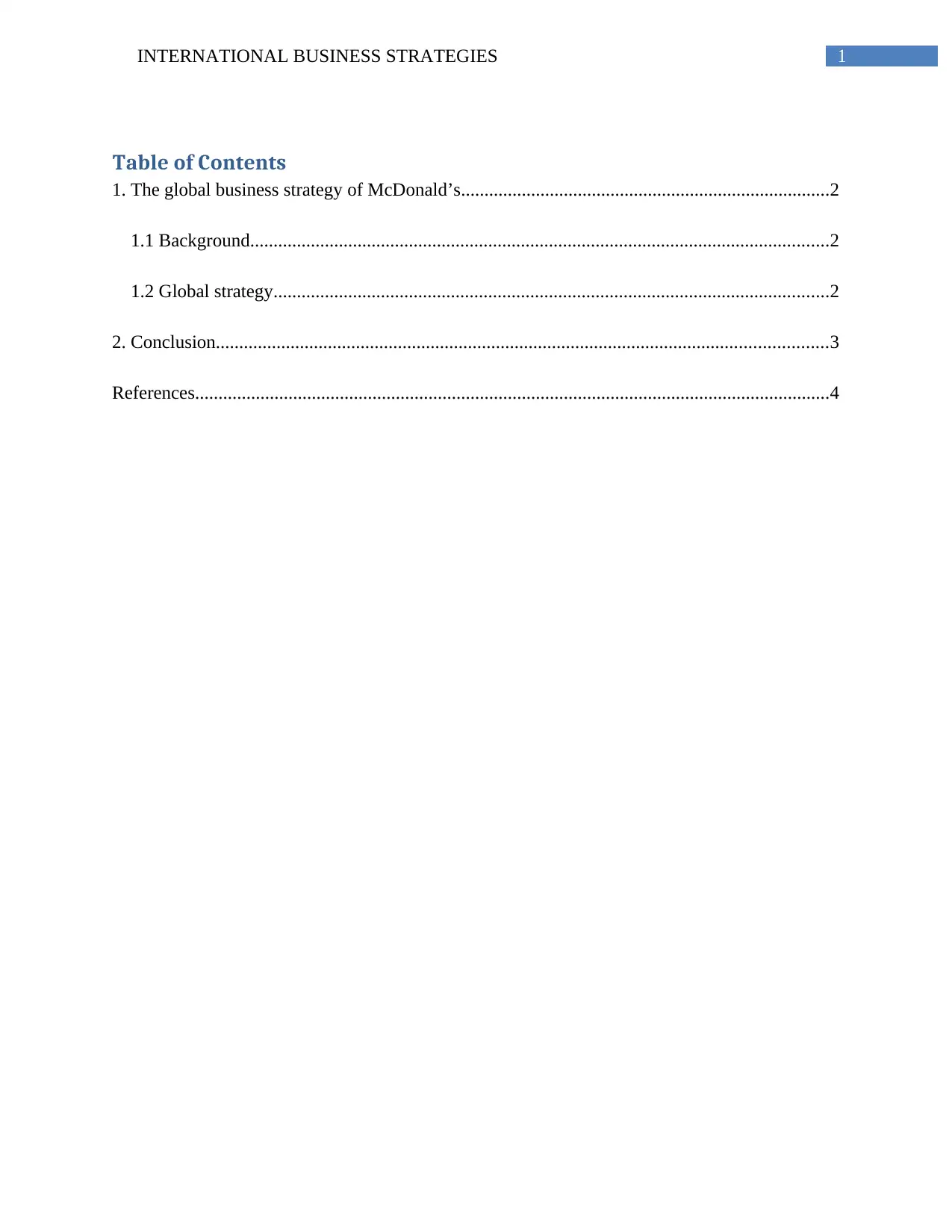
1INTERNATIONAL BUSINESS STRATEGIES
Table of Contents
1. The global business strategy of McDonald’s...............................................................................2
1.1 Background............................................................................................................................2
1.2 Global strategy.......................................................................................................................2
2. Conclusion...................................................................................................................................3
References........................................................................................................................................4
Table of Contents
1. The global business strategy of McDonald’s...............................................................................2
1.1 Background............................................................................................................................2
1.2 Global strategy.......................................................................................................................2
2. Conclusion...................................................................................................................................3
References........................................................................................................................................4
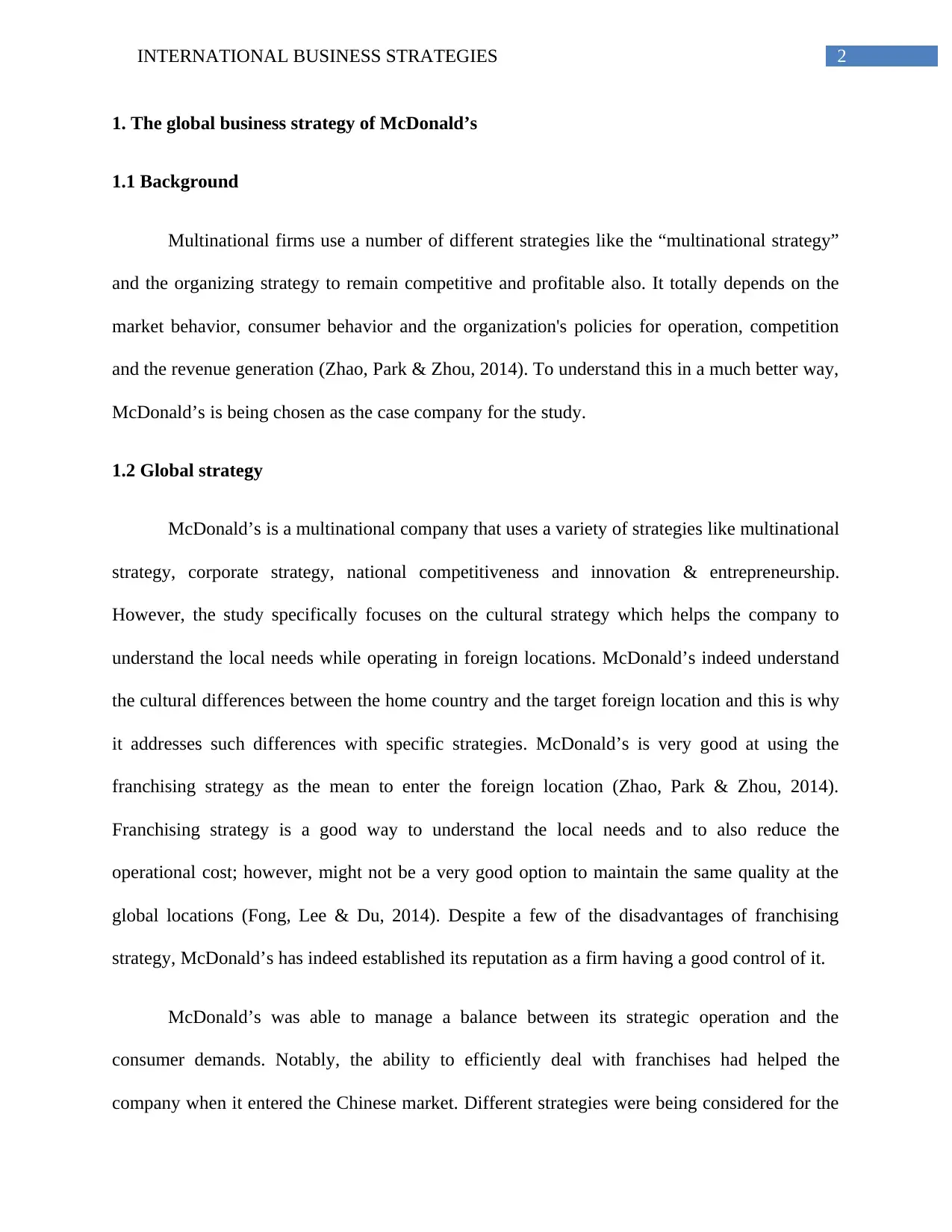
2INTERNATIONAL BUSINESS STRATEGIES
1. The global business strategy of McDonald’s
1.1 Background
Multinational firms use a number of different strategies like the “multinational strategy”
and the organizing strategy to remain competitive and profitable also. It totally depends on the
market behavior, consumer behavior and the organization's policies for operation, competition
and the revenue generation (Zhao, Park & Zhou, 2014). To understand this in a much better way,
McDonald’s is being chosen as the case company for the study.
1.2 Global strategy
McDonald’s is a multinational company that uses a variety of strategies like multinational
strategy, corporate strategy, national competitiveness and innovation & entrepreneurship.
However, the study specifically focuses on the cultural strategy which helps the company to
understand the local needs while operating in foreign locations. McDonald’s indeed understand
the cultural differences between the home country and the target foreign location and this is why
it addresses such differences with specific strategies. McDonald’s is very good at using the
franchising strategy as the mean to enter the foreign location (Zhao, Park & Zhou, 2014).
Franchising strategy is a good way to understand the local needs and to also reduce the
operational cost; however, might not be a very good option to maintain the same quality at the
global locations (Fong, Lee & Du, 2014). Despite a few of the disadvantages of franchising
strategy, McDonald’s has indeed established its reputation as a firm having a good control of it.
McDonald’s was able to manage a balance between its strategic operation and the
consumer demands. Notably, the ability to efficiently deal with franchises had helped the
company when it entered the Chinese market. Different strategies were being considered for the
1. The global business strategy of McDonald’s
1.1 Background
Multinational firms use a number of different strategies like the “multinational strategy”
and the organizing strategy to remain competitive and profitable also. It totally depends on the
market behavior, consumer behavior and the organization's policies for operation, competition
and the revenue generation (Zhao, Park & Zhou, 2014). To understand this in a much better way,
McDonald’s is being chosen as the case company for the study.
1.2 Global strategy
McDonald’s is a multinational company that uses a variety of strategies like multinational
strategy, corporate strategy, national competitiveness and innovation & entrepreneurship.
However, the study specifically focuses on the cultural strategy which helps the company to
understand the local needs while operating in foreign locations. McDonald’s indeed understand
the cultural differences between the home country and the target foreign location and this is why
it addresses such differences with specific strategies. McDonald’s is very good at using the
franchising strategy as the mean to enter the foreign location (Zhao, Park & Zhou, 2014).
Franchising strategy is a good way to understand the local needs and to also reduce the
operational cost; however, might not be a very good option to maintain the same quality at the
global locations (Fong, Lee & Du, 2014). Despite a few of the disadvantages of franchising
strategy, McDonald’s has indeed established its reputation as a firm having a good control of it.
McDonald’s was able to manage a balance between its strategic operation and the
consumer demands. Notably, the ability to efficiently deal with franchises had helped the
company when it entered the Chinese market. Different strategies were being considered for the
⊘ This is a preview!⊘
Do you want full access?
Subscribe today to unlock all pages.

Trusted by 1+ million students worldwide
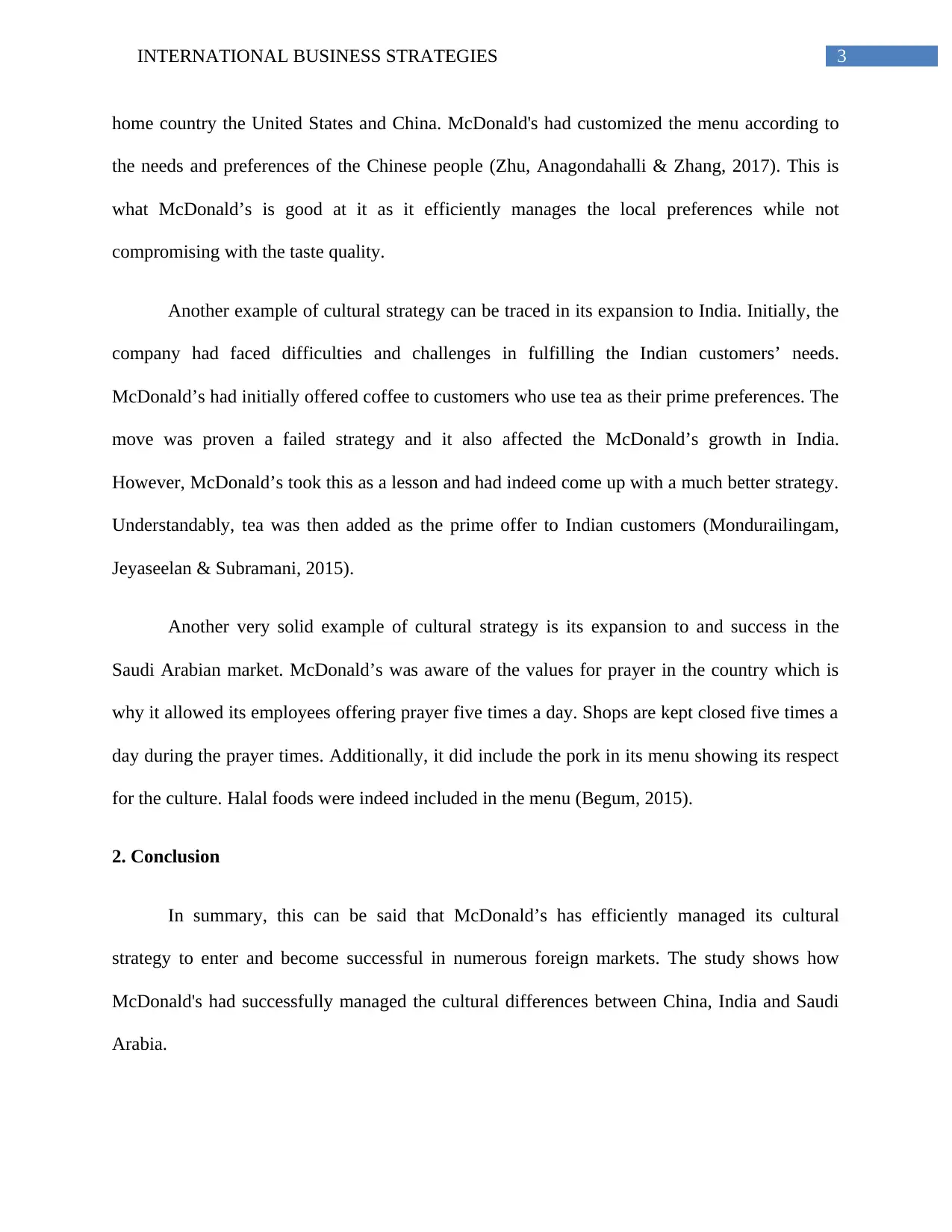
3INTERNATIONAL BUSINESS STRATEGIES
home country the United States and China. McDonald's had customized the menu according to
the needs and preferences of the Chinese people (Zhu, Anagondahalli & Zhang, 2017). This is
what McDonald’s is good at it as it efficiently manages the local preferences while not
compromising with the taste quality.
Another example of cultural strategy can be traced in its expansion to India. Initially, the
company had faced difficulties and challenges in fulfilling the Indian customers’ needs.
McDonald’s had initially offered coffee to customers who use tea as their prime preferences. The
move was proven a failed strategy and it also affected the McDonald’s growth in India.
However, McDonald’s took this as a lesson and had indeed come up with a much better strategy.
Understandably, tea was then added as the prime offer to Indian customers (Mondurailingam,
Jeyaseelan & Subramani, 2015).
Another very solid example of cultural strategy is its expansion to and success in the
Saudi Arabian market. McDonald’s was aware of the values for prayer in the country which is
why it allowed its employees offering prayer five times a day. Shops are kept closed five times a
day during the prayer times. Additionally, it did include the pork in its menu showing its respect
for the culture. Halal foods were indeed included in the menu (Begum, 2015).
2. Conclusion
In summary, this can be said that McDonald’s has efficiently managed its cultural
strategy to enter and become successful in numerous foreign markets. The study shows how
McDonald's had successfully managed the cultural differences between China, India and Saudi
Arabia.
home country the United States and China. McDonald's had customized the menu according to
the needs and preferences of the Chinese people (Zhu, Anagondahalli & Zhang, 2017). This is
what McDonald’s is good at it as it efficiently manages the local preferences while not
compromising with the taste quality.
Another example of cultural strategy can be traced in its expansion to India. Initially, the
company had faced difficulties and challenges in fulfilling the Indian customers’ needs.
McDonald’s had initially offered coffee to customers who use tea as their prime preferences. The
move was proven a failed strategy and it also affected the McDonald’s growth in India.
However, McDonald’s took this as a lesson and had indeed come up with a much better strategy.
Understandably, tea was then added as the prime offer to Indian customers (Mondurailingam,
Jeyaseelan & Subramani, 2015).
Another very solid example of cultural strategy is its expansion to and success in the
Saudi Arabian market. McDonald’s was aware of the values for prayer in the country which is
why it allowed its employees offering prayer five times a day. Shops are kept closed five times a
day during the prayer times. Additionally, it did include the pork in its menu showing its respect
for the culture. Halal foods were indeed included in the menu (Begum, 2015).
2. Conclusion
In summary, this can be said that McDonald’s has efficiently managed its cultural
strategy to enter and become successful in numerous foreign markets. The study shows how
McDonald's had successfully managed the cultural differences between China, India and Saudi
Arabia.
Paraphrase This Document
Need a fresh take? Get an instant paraphrase of this document with our AI Paraphraser
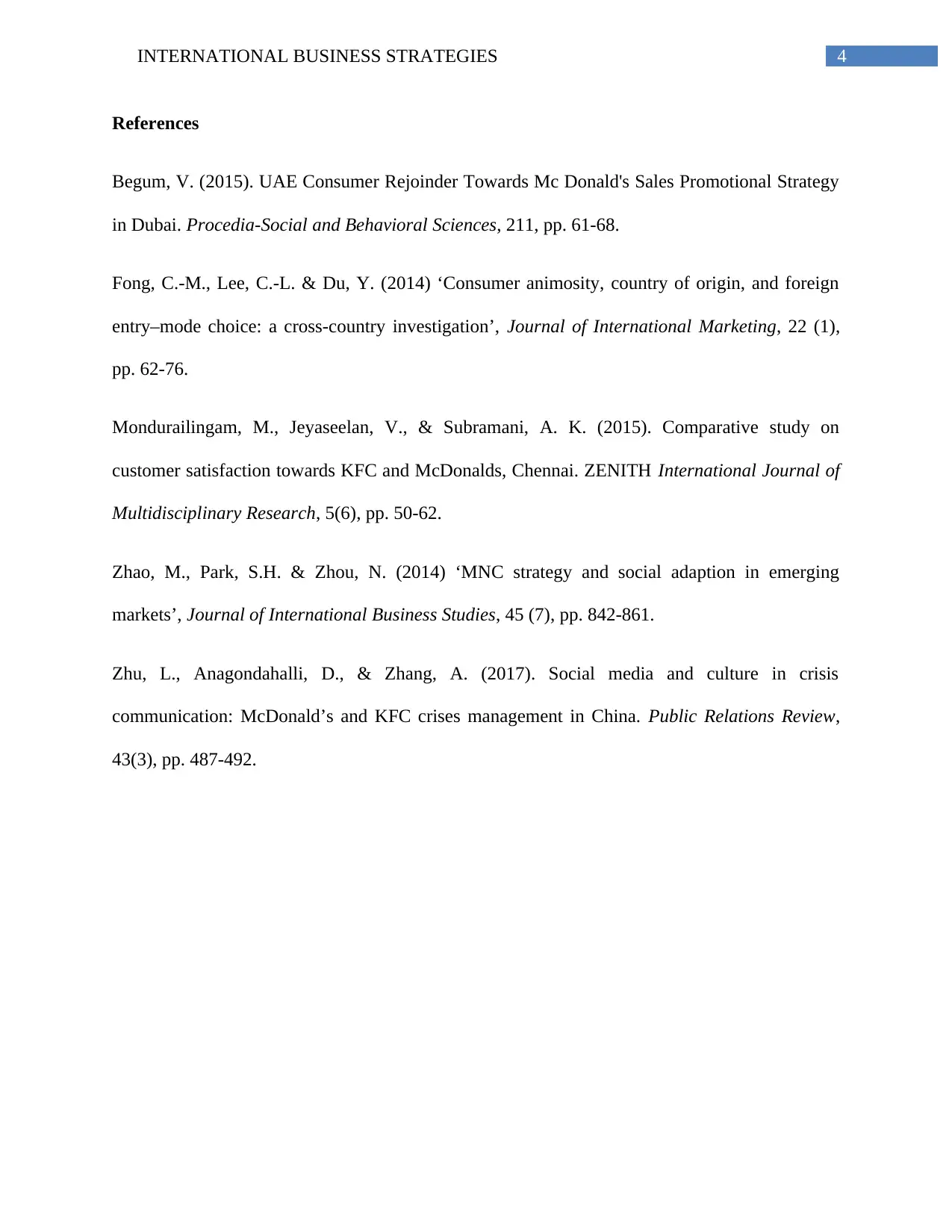
4INTERNATIONAL BUSINESS STRATEGIES
References
Begum, V. (2015). UAE Consumer Rejoinder Towards Mc Donald's Sales Promotional Strategy
in Dubai. Procedia-Social and Behavioral Sciences, 211, pp. 61-68.
Fong, C.-M., Lee, C.-L. & Du, Y. (2014) ‘Consumer animosity, country of origin, and foreign
entry–mode choice: a cross-country investigation’, Journal of International Marketing, 22 (1),
pp. 62-76.
Mondurailingam, M., Jeyaseelan, V., & Subramani, A. K. (2015). Comparative study on
customer satisfaction towards KFC and McDonalds, Chennai. ZENITH International Journal of
Multidisciplinary Research, 5(6), pp. 50-62.
Zhao, M., Park, S.H. & Zhou, N. (2014) ‘MNC strategy and social adaption in emerging
markets’, Journal of International Business Studies, 45 (7), pp. 842-861.
Zhu, L., Anagondahalli, D., & Zhang, A. (2017). Social media and culture in crisis
communication: McDonald’s and KFC crises management in China. Public Relations Review,
43(3), pp. 487-492.
References
Begum, V. (2015). UAE Consumer Rejoinder Towards Mc Donald's Sales Promotional Strategy
in Dubai. Procedia-Social and Behavioral Sciences, 211, pp. 61-68.
Fong, C.-M., Lee, C.-L. & Du, Y. (2014) ‘Consumer animosity, country of origin, and foreign
entry–mode choice: a cross-country investigation’, Journal of International Marketing, 22 (1),
pp. 62-76.
Mondurailingam, M., Jeyaseelan, V., & Subramani, A. K. (2015). Comparative study on
customer satisfaction towards KFC and McDonalds, Chennai. ZENITH International Journal of
Multidisciplinary Research, 5(6), pp. 50-62.
Zhao, M., Park, S.H. & Zhou, N. (2014) ‘MNC strategy and social adaption in emerging
markets’, Journal of International Business Studies, 45 (7), pp. 842-861.
Zhu, L., Anagondahalli, D., & Zhang, A. (2017). Social media and culture in crisis
communication: McDonald’s and KFC crises management in China. Public Relations Review,
43(3), pp. 487-492.
1 out of 5
Related Documents
Your All-in-One AI-Powered Toolkit for Academic Success.
+13062052269
info@desklib.com
Available 24*7 on WhatsApp / Email
![[object Object]](/_next/static/media/star-bottom.7253800d.svg)
Unlock your academic potential
Copyright © 2020–2026 A2Z Services. All Rights Reserved. Developed and managed by ZUCOL.





